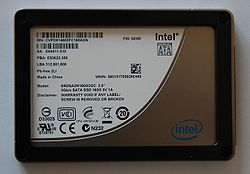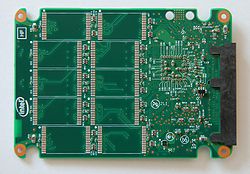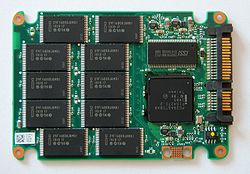Intel X25-M G2 Postville SSDs
| Hinweis: Bitte beachten Sie, dass dieser Artikel / diese Kategorie sich entweder auf ältere Software/Hardware Komponenten bezieht oder aus sonstigen Gründen nicht mehr gewartet wird. Diese Seite wird nicht mehr aktualisiert und ist rein zu Referenzzwecken noch hier im Archiv abrufbar. |
|---|
Dieser Artikel enthält Detail-Informationen zu Intel X25-M G2 Postville SSDs. Einen Überblick über alle Intel SSD Serien zeigt der Artikel Intel SSDs im Überblick.
Allgemeine Informationen
- SSD Serie: Intel X25-M G2 Postville
- Datenblätter:
- Formfaktor: 2,5"
- NAND Flash Memory: MLCStrukturbreite: * 34nm (4 KiB Page Size)
- Schnittstelle: SATA 3 Gb/s ("SATA II")
- Weitere Informationen:
- Intel SSD X25-M Series (G2, 34nm) (ark.intel.com)
- X25-M / X18-M Enterprise Addendum
Modelle
| SSD | Kapazität (netto) |
Kapazität (brutto) |
Spare Area (GB und % zus. zur Netto-Kap.) |
Flash-Chips | Haltbarkeit (Endurance) |
Durchsatz (max. Bandbreite) |
IOPS (max. Random IOPS Performance) | |||
|---|---|---|---|---|---|---|---|---|---|---|
| Lesen | Schreiben | Lesen | Schreiben (über erste 8 GiB) |
Schreiben (über ges. Datenbereich) | ||||||
| SSDSA2MH080G2xx | 80 GB | unbek. | unbek. | unbek. | 7,5 TB | 250 MB/s | 70 MB/s | 35.000 IOPS | 6.600 IOPS | 300 IOPS |
| SSDSA2MH120G2xx | 120 GB | unbek. | unbek. | unbek. | 11,25 TB | 250 MB/s | 100 MB/s | 35.000 IOPS | 8.600 IOPS | 300 IOPS |
| SSDSA2MH160G2xx | 160 GB (160.041.885.696 Byte) |
160 GiB (171,8 GB) |
11,8 GB (7,3%) |
10 Stück 16 GiB (29F16B08JAMD1)[1] |
15 TB | 250 MB/s | 100 MB/s | 35.000 IOPS | 8.600 IOPS | 300 IOPS |
Testberichte
- Intel X25-M G2: Dissected and Performance Preview (anandtech.com), 22.07.2009
- Intel X25-M G2 Postville - Die zweite SSD-Generation im Test (tecchannel.de), 14.09.2009
Firmware
| Date | Revision | Description |
|---|---|---|
| 06.01.2011 | 2CV102M3 | This firmware revision fixes enumeration and slow boot issues on SATA 6Gb/s controllers and adds improvements to SMART attributes for more accurate reporting of drive health along with improved NCQ capability. |
| 30.09.2009 | 2CV102HD | This firmware revision contains continuous improvement optimizations intended to provide the best possible user experience with the Intel SSD. |
| 26.10.2009 | 2CV102HA | This firmware revision supports the ATA Data Set Management Command Trim attribute. Additionally, this firmware revision includes several continuous improvement optimizations that provide increased write performance on 160 GB SSDs. |
| 17.08.2009 | 2CV102G9 | This firmware revision is for Intel X25-M SATA SSD 34nm products only. (Intel X18-M SATA SSD 34nm products do not require this
firmware update.) This revision fixes the following two issues: 1) System hangs with BIOS drive password enabled. 2) System inoperable when BIOS drive password disabled or changed. |
Quelle: Firmware Release Notes oder Auslesen von SSD-Informationen.
Programmausgaben
smartctl
root@ubuntu-11-10:~# smartctl -a /dev/sda
smartctl 5.41 2011-06-09 r3365 [x86_64-linux-3.0.0-15-generic] (local build)
Copyright (C) 2002-11 by Bruce Allen, http://smartmontools.sourceforge.net
=== START OF INFORMATION SECTION ===
Model Family: Intel X18-M/X25-M/X25-V G2 SSDs
Device Model: INTEL SSDSA2M160G2GC
Serial Number: CVPO014602FC160AGN
LU WWN Device Id: 5 001517 95928e489
Firmware Version: 2CV102M3
User Capacity: 160,041,885,696 bytes [160 GB]
Sector Size: 512 bytes logical/physical
Device is: In smartctl database [for details use: -P show]
ATA Version is: 7
ATA Standard is: ATA/ATAPI-7 T13 1532D revision 1
Local Time is: Wed Jan 25 07:15:55 2012 CET
SMART support is: Available - device has SMART capability.
SMART support is: Enabled
=== START OF READ SMART DATA SECTION ===
SMART overall-health self-assessment test result: PASSED
General SMART Values:
Offline data collection status: (0x00) Offline data collection activity
was never started.
Auto Offline Data Collection: Disabled.
Self-test execution status: ( 0) The previous self-test routine completed
without error or no self-test has ever
been run.
Total time to complete Offline
data collection: ( 1) seconds.
Offline data collection
capabilities: (0x71) SMART execute Offline immediate.
No Auto Offline data collection support.
Suspend Offline collection upon new
command.
No Offline surface scan supported.
Self-test supported.
Conveyance Self-test supported.
Selective Self-test supported.
SMART capabilities: (0x0003) Saves SMART data before entering
power-saving mode.
Supports SMART auto save timer.
Error logging capability: (0x01) Error logging supported.
General Purpose Logging supported.
Short self-test routine
recommended polling time: ( 1) minutes.
Extended self-test routine
recommended polling time: ( 1) minutes.
Conveyance self-test routine
recommended polling time: ( 1) minutes.
SMART Attributes Data Structure revision number: 5
Vendor Specific SMART Attributes with Thresholds:
ID# ATTRIBUTE_NAME FLAG VALUE WORST THRESH TYPE UPDATED WHEN_FAILED RAW_VALUE
3 Spin_Up_Time 0x0020 100 100 000 Old_age Offline - 0
4 Start_Stop_Count 0x0030 100 100 000 Old_age Offline - 0
5 Reallocated_Sector_Ct 0x0032 100 100 000 Old_age Always - 0
9 Power_On_Hours 0x0032 100 100 000 Old_age Always - 1657
12 Power_Cycle_Count 0x0032 100 100 000 Old_age Always - 820
192 Unsafe_Shutdown_Count 0x0032 100 100 000 Old_age Always - 13
225 Host_Writes_32MiB 0x0030 100 100 000 Old_age Offline - 39480
226 Workld_Media_Wear_Indic 0x0032 100 100 000 Old_age Always - 2881210
227 Workld_Host_Reads_Perc 0x0032 100 100 000 Old_age Always - 50
228 Workload_Minutes 0x0032 100 100 000 Old_age Always - 551593203
232 Available_Reservd_Space 0x0033 100 100 010 Pre-fail Always - 0
233 Media_Wearout_Indicator 0x0032 100 100 000 Old_age Always - 0
184 End-to-End_Error 0x0033 100 100 090 Pre-fail Always - 0
SMART Error Log Version: 1
No Errors Logged
SMART Self-test log structure revision number 1
Num Test_Description Status Remaining LifeTime(hours) LBA_of_first_error
# 1 Reserved (0x28) Completed without error 00% 70 -
Note: selective self-test log revision number (0) not 1 implies that no selective self-test has ever been run
SMART Selective self-test log data structure revision number 0
Note: revision number not 1 implies that no selective self-test has ever been run
SPAN MIN_LBA MAX_LBA CURRENT_TEST_STATUS
1 0 0 Not_testing
2 0 0 Not_testing
3 0 0 Not_testing
4 0 0 Not_testing
5 0 0 Not_testing
Selective self-test flags (0x0):
After scanning selected spans, do NOT read-scan remainder of disk.
If Selective self-test is pending on power-up, resume after 0 minute delay.
hdparm
root@ubuntu-11-10:~# hdparm -I /dev/sda
/dev/sda:
ATA device, with non-removable media
Model Number: INTEL SSDSA2M160G2GC
Serial Number: CVPO014602FC160AGN
Firmware Revision: 2CV102M3
Transport: Serial, ATA8-AST, SATA 1.0a, SATA II Extensions, SATA Rev 2.5, SATA Rev 2.6
Standards:
Used: ATA/ATAPI-7 T13 1532D revision 1
Supported: 7 6 5 4
Configuration:
Logical max current
cylinders 16383 16383
heads 16 16
sectors/track 63 63
--
CHS current addressable sectors: 16514064
LBA user addressable sectors: 268435455
LBA48 user addressable sectors: 312581808
Logical Sector size: 512 bytes
Physical Sector size: 512 bytes
device size with M = 1024*1024: 152627 MBytes
device size with M = 1000*1000: 160041 MBytes (160 GB)
cache/buffer size = unknown
Nominal Media Rotation Rate: Solid State Device
Capabilities:
LBA, IORDY(can be disabled)
Queue depth: 32
Standby timer values: spec'd by Standard, no device specific minimum
R/W multiple sector transfer: Max = 16 Current = 16
DMA: mdma0 mdma1 mdma2 udma0 udma1 udma2 udma3 udma4 udma5 *udma6
Cycle time: min=120ns recommended=120ns
PIO: pio0 pio1 pio2 pio3 pio4
Cycle time: no flow control=120ns IORDY flow control=120ns
Commands/features:
Enabled Supported:
* SMART feature set
Security Mode feature set
* Power Management feature set
* Write cache
* Look-ahead
* Host Protected Area feature set
* WRITE_BUFFER command
* READ_BUFFER command
* NOP cmd
* DOWNLOAD_MICROCODE
SET_MAX security extension
* 48-bit Address feature set
* Device Configuration Overlay feature set
* Mandatory FLUSH_CACHE
* FLUSH_CACHE_EXT
* SMART error logging
* SMART self-test
* General Purpose Logging feature set
* WRITE_{DMA|MULTIPLE}_FUA_EXT
* 64-bit World wide name
* IDLE_IMMEDIATE with UNLOAD
* WRITE_UNCORRECTABLE_EXT command
* {READ,WRITE}_DMA_EXT_GPL commands
* Segmented DOWNLOAD_MICROCODE
* Gen1 signaling speed (1.5Gb/s)
* Gen2 signaling speed (3.0Gb/s)
* Native Command Queueing (NCQ)
* Phy event counters
Device-initiated interface power management
* Software settings preservation
* Data Set Management TRIM supported (limit 8 blocks)
* Deterministic read ZEROs after TRIM
Security:
Master password revision code = 65534
supported
not enabled
not locked
frozen
not expired: security count
supported: enhanced erase
2min for SECURITY ERASE UNIT. 2min for ENHANCED SECURITY ERASE UNIT.
Logical Unit WWN Device Identifier: 500151795928e489
NAA : 5
IEEE OUI : 001517
Unique ID : 95928e489
Checksum: correct
Einzelnachweise
- ↑ Intel X25-M SSD Review (160GB) (storagereview.com)
|
Autor: Werner Fischer Werner Fischer arbeitet im Product Management Team von Thomas-Krenn. Er evaluiert dabei neueste Technologien und teilt sein Wissen in Fachartikeln, bei Konferenzen und im Thomas-Krenn Wiki. Bereits 2005 - ein Jahr nach seinem Abschluss des Studiums zu Computer- und Mediensicherheit an der FH Hagenberg - heuerte er beim bayerischen Server-Hersteller an. Als Öffi-Fan nutzt er gerne Bus & Bahn und genießt seinen morgendlichen Spaziergang ins Büro.
|




